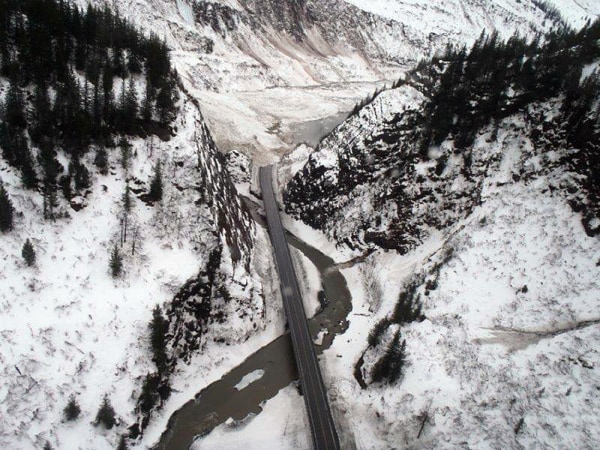Results 1 to 1 of 1
Thread Information
Users Browsing this Thread
There are currently 1 users browsing this thread. (0 members and 1 guests)
-
01-27-2014, 10:00 PM #1
Warm temps blamed for massive avalanche that cut off Alaskan town
Warm temps blamed for massive avalanche that cut off Alaskan town
 Alaska DOTAn avalanche blocked a stretch of Richardson Highway, the only road connecting Valdez to the rest of the Alaska highway system.
Alaska DOTAn avalanche blocked a stretch of Richardson Highway, the only road connecting Valdez to the rest of the Alaska highway system.
By Erik Ortiz, Staff Writer, NBC News
A warmer winter is being blamed for the mammoth Alaskan avalanche that has cut off a port city’s sole road to the outside — stoking fears of flash floods and future landslides.
Snowy debris hundreds of feet long and up to 40 feet deep slammed onto Valdez’s Richardson Highway early Friday and again on Saturday.
The 50-mile stretch of rural road might not be reopened for a week, and observers say a collapse of this magnitude appears unprecedented for the area.
“This avalanche cycle is a historically significant event,” said Sarah Carter, education coordinator and forecaster with the Alaska Avalanche Information Center in Valdez.
She said it’s not uncommon to see avalanches, but the abnormal, above-freezing temperatures over the past 10 days – coupled with the rainfall – have weakened the snow pack.
Valdez was forecasted to have a high of 41 degrees and low of 40 degrees on Monday — a far cry from the arctic blast that has plunged much of the country, including the South, into a dangerous cold. Some parts of Alaska could even be in the lower 60s this week, according to reports.
“This cycle is more consistent with what we see in the springtime,” Carter told NBC News. “Spring came early this year — and it came all at once.”
The mountain — part of an area nicknamed Snowslide Gulch — shed its first layer of snow around 6:30 a.m. Friday. Alaska transportation officials said no one was trapped in the slide, although one vehicle hit snow that had fallen onto the road. The driver was unharmed.
For now, Valdez’s 4,000 residents are trying to get on with life, however inconvenienced they might already be.
Safeway, which operates the only major supermarket in the city, was shipping in a barge of supplies to residents Sunday with another set for Monday, Valdez officials said. They also said they don’t expect a fuel shortage.
Valdez is known for its oil terminal, where ships unload the resource from the Trans-Alaska pipeline.
Residents say the options for getting out of town are sparse. With the highway closed off, the other two transportation options are a ferry, which runs on a limited schedule, or via air.
“We’re used to being closed off in a sense,” Laurie Prax, who owns local radio station KVAK, told NBC News. “The nearest town is 120 miles away. A weekend trip is a six-hour drive to Anchorage. When you go to the hospital, you’re medevaced out. It’s a different world.”
The same highway was last closed in 2006 because of flooding.
Prax said residents aren’t quite panicking, but some are worried that the large pool of water building up behind the avalanche could cause intense flooding.
The city set up shelters in the event of evacuations caused by flash floods.
Maine transplants Joshua and Tabatha Swierk operate a lodge along Robe Lake, and said they were out of town when the avalanche first struck Friday. They returned Sunday night by ferry, worried their heli-skiing business would be underwater.
They planned to take a helicopter tour Monday to survey the area.
“We see avalanches all the time, and it’s not uncommon for them to hit the roadway,” Tabatha Swierk said. “But this is something else.”
Carter said temperatures will have to drop in order for the mountain to stabilize. Whether another huge landslide can happen — in Valdez or elsewhere — remains to be seen.
“This was an abnormal event,” Carter said. “If we do have weather patterns that produce storms with warmer temperatures, we could indeed see avalanches of this caliber more frequently.”
http://usnews.nbcnews.com/_news/2014...skan-town?lite
NO AMNESTY
Don't reward the criminal actions of millions of illegal aliens by giving them citizenship.
Sign in and post comments here.
Please support our fight against illegal immigration by joining ALIPAC's email alerts here https://eepurl.com/cktGTn


 LinkBack URL
LinkBack URL About LinkBacks
About LinkBacks




 Reply With Quote
Reply With Quote


Durbin pushes voting rights for illegal aliens without public...
04-25-2024, 09:10 PM in Non-Citizen & illegal migrant voters